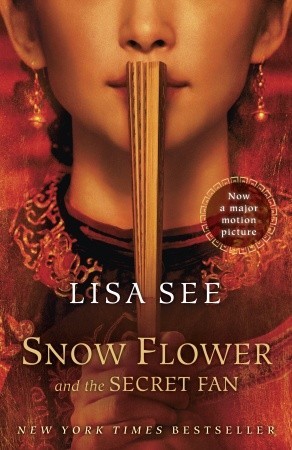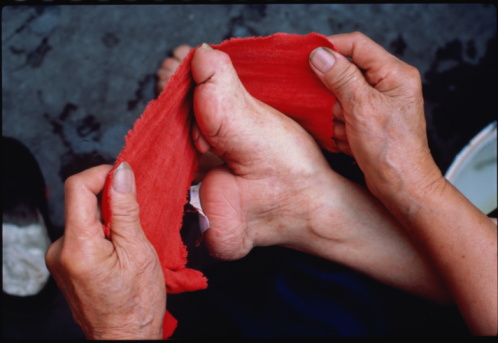When I knew I couldn't suffer another moment of pain, and tears fell on my bloody bindings, my mother spoke softly into my ear, encouraging me to go one more hour, one more day, one more week, reminding me of the rewards I would have if I carried on a little longer. In this way, she taught me how to endure — not just the physical trials of footbinding and childbearing but the more torturous pain of the heart, mind, and soul.Snow Flower and the Secret Fan is a fascinating historical novel in its details -- I haven't thought much about footbinding before, and certainly never thought it was as widespread as it evidently was, lasting a thousand years throughout all but one province of China. I never knew how excruciating the process was, with the young girls forced to walk circles in their bloody bindings until the bones cracked beneath them. I never considered how binding a daughter's foot was seen as an act of mother love since a girl with unbound feet would have been considered unmarriageable. I never knew how erotic a woman's bound feet were for her husband (and according to wikipedia, "Qing Dynasty sex manuals listed 48 different ways of playing with women's bound feet"). In so many ways, Chinese footbinding seems like a cultural cousin to female genital mutilation (and especially in the ways that both barbaric practises are designed to entrench a man's power over his wife), but as little as I knew of the actual details of footbinding, that's not all that this book is about.
If footbinding symbolises the ways in which Chinese men exerted their control, nu shu writing was a way for women to subtly rebel: although forbidden to learn the writing of men, the women of Hunan county developed their own system of writing, which they wove into cloth, embroidered onto handkerchiefs, and embellished into the folds of fans. Most of the women, expected to spend their days toiling in their own chamber, would have had "sworn sisters" to socialise with, but if a woman was very lucky, she would have been matched with a laotong or "old same" -- a sisterly relationship with a love and bond stronger than that between a wife and her husband. These friendships seemed to be the only consolation for women -- despised as daughters for being "useless branches" on the family tree, married out young to other families (often far from the natal home), put into service to highly critical and demanding mothers-in-law, used for "bed business" by their husbands to produce the desired sons (and woe betide the woman who dares produce daughters) -- at least the women had the emotional support of other women in their situation.
Snow Flower and the Secret Fan is told as the memoir of Lily, an eighty-year-old matriarch who, although born as the second daughter of a lowly farmer, had been fortunate to have had perfect "golden lilies" (feet of the ideal 7 cm size) and who had been matched as the laotong of Snow Flower, a girl of higher social standing. Because of these advantages, Lily was able to marry into a very good family, eventually taking the title of Lady Lu when her mother-in-law passed. Through Lily's memories of a long life, the reader is immersed in the world of the women's chamber (with much interesting information on everything from story singing and dowry making to funeral rites) and the historical facts of the era (with the menace of a typhoid epidemic and a heart-pounding escape into the mountains during the Taiping Rebellion -- imagine all those women climbing a rocky mountain path on their deformed feet).
And as interesting as all of the historical information was, the centerpiece of this book is the laotong relationship between Lily and Snow Flower, and unfortunately, this was the weakest part. Supposedly matched in their "eight characters", the two girls are recognised as more or less soul mates -- a relationship that is rare and prestigious -- but right from the beginning, when the girls meet as seven-year-olds with freshly bound feet, they are like night and day. Snow Flower speaks poetically and Lily hopes that one day she'll feel the way that her friend speaks. As they get older, there seems to always be a gap between the way the relationship is supposed to work and the way that Lily is feeling, and when it is revealed that maybe Snow Flower isn't everything she's pretending to be, I couldn't see why this one-on-one relationship is supposed to be superior to having a group of sworn sisters to socialise with. For two women who grew up with this idealised female friendship, it was frustrating for me when neither was able to fully reveal herself to the other or fully offer support when the other needed it. I also would have liked more on how Lily behaved as the mother of a daughter and as a mother-in-law herself -- was she properly cold and demanding while regretting that was the role she was expected to play? This book may as well be written in nu shu for the amount of appeal I think it would have for men, so I would have liked for Lisa See to have gone even deeper into the feminine interior of what could have been a more fully human main character.
For the historical aspects, which See really did bring to life, I would give five stars. For the imperfect storyline, only three. Averaging out, four stars seem a little high (did I love this book?) so I'm rounding down this time -- and especially because I listened to this book and the narrator had a breathless, melodramatic voice, perpetually on the verge of tears of giggles.



